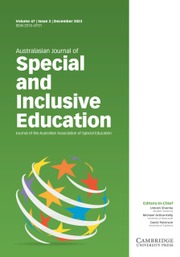Article contents
The Association Between Parent Engagement and Child Outcomes in Social Skills Training Programs: Discovering the Secret Agent Society in Partnership
Published online by Cambridge University Press: 31 March 2020
Abstract
Previous research in clinical, community, and school settings has demonstrated positive outcomes for the Secret Agent Society (SAS) social skills training program. This is designed to help children on the autism spectrum become more aware of emotions in themselves and others and to ‘problem-solve’ complex social scenarios. Parents play a key role in the implementation of the SAS program, attending information and support sessions with other parents and providing supervision, rewards, and feedback as their children complete weekly ‘home mission’ assignments. Drawing on data from a school-based evaluation of the SAS program, we examined whether parents’ engagement with these elements of the intervention was linked to the quality of their children’s participation and performance. Sixty-eight 8–14-year-olds (M age = 10.7) with a diagnosis of autism participated in the program. The findings indicated that ratings of parental engagement were positively correlated with children’s competence in completing home missions and with the quality of their contribution during group teaching sessions. However, there was a less consistent relationship between parental engagement and measures of children’s social and emotional skill gains over the course of the program.
- Type
- Original Articles
- Information
- Australasian Journal of Special and Inclusive Education , Volume 44 , Issue 1 , July 2020 , pp. 46 - 59
- Copyright
- © The Author(s) 2020
Footnotes
This manuscript was accepted under the Editorship of Umesh Sharma.
References
- 6
- Cited by


